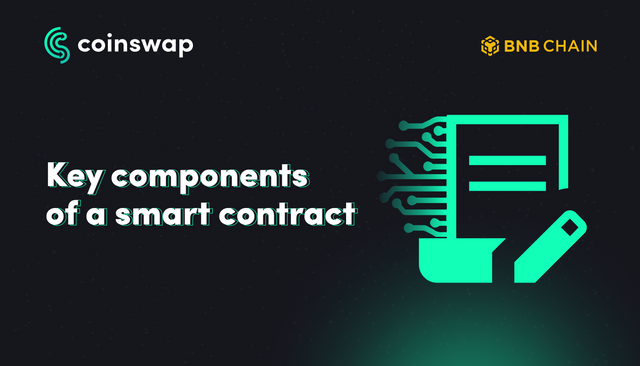The Significance and Key Components of a Smart Contract

Smart contracts serve as the bedrock of decentralized finance (DeFi), revolutionizing the way transactions are securely and transparently executed on blockchain networks. 🌐💼 These autonomous contracts autonomously enforce and facilitate agreement terms between parties, eliminating intermediaries and mitigating fraud risks. Now, let's explore the fundamental components comprising a smart contract and grasp their importance.
Code: At the heart of every smart contract is its code, written in a programming language such as Solidity for Ethereum. This code defines the rules and conditions of the contract, including how it will execute transactions and handle data.
Digital Signatures: Smart contracts utilize digital signatures to verify the identity of parties involved in a transaction. Each participant signs the contract with their private key, ensuring authenticity and preventing tampering.
Decentralized Network: Smart contracts operate on decentralized blockchain networks, ensuring transparency and immutability. Transactions are recorded on a distributed ledger accessible to all network participants, eliminating the need for a central authority.
Automation: One of the most significant features of smart contracts is their ability to automate processes. Once deployed, smart contracts execute transactions automatically when predefined conditions are met, reducing the need for manual intervention.
Conditional Statements: Smart contracts include conditional statements, also known as "if-then" clauses, that define the conditions under which transactions will be executed. These statements ensure that transactions are only processed when specific criteria are fulfilled.
Token Standards: In the context of DeFi, smart contracts often adhere to token standards such as ERC-20 (Ethereum Request for Comments) or BEP-20 (Binance Smart Chain Token Standard). These standards define the basic functionalities and interfaces for tokens, enabling interoperability within the ecosystem.
Gas Fees: Smart contracts require gas fees to execute transactions on the blockchain network. Gas fees compensate network validators for processing transactions and ensure the security and efficiency of the network.
Oracle Integration: Some smart contracts rely on oracles to access real-world data, such as price feeds or weather information, to trigger transactions. Oracles serve as bridges between blockchain networks and external data sources, enhancing the functionality and utility of smart contracts.
By incorporating these key components, smart contracts enable a wide range of decentralized applications (DApps) and financial instruments, including decentralized exchanges (DEXs), lending protocols, and yield farming platforms, driving innovation and efficiency in the DeFi ecosystem. 🚀🔒